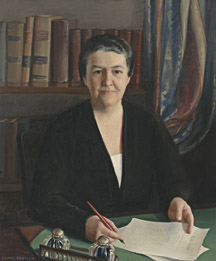During a ceremony in Washington D.C. in 2004, U.S. Congresswoman and then-House Democratic Leader Nancy Pelosi (now Speaker of the U.S. House of Representatives) described a woman in the portrait that she and her House colleagues were unveiling that day to be hung in Pelosi’s office.
“These were the two defining traits of Mary Norton – a strong and able leader, with a kind and caring heart. Her nicknames tell the same story. She was known as both ‘fighting Mary’ and ‘Aunt Mary.’”
The Jersey City native was a trailblazer in her day, starting with Norton’s election in 1925 to the House of Representatives as the first woman Democrat elected to the House and first woman elected from an East Coast state.
She went on to make history by serving 13 terms in the House until her retirement in 1951.
Norton served as an example for her female and even male colleagues during her time in office by becoming the chair of three Congressional Committees: Veterans Affairs, the District of Columbia, and Labor. In her capacity as chair of these committees, she wrote and helped pass legislation establishing minimum wage rates for workers of firms engaged in interstate commerce, funding for daycare centers, and equal pay for women.
Yet despite being a feminist pioneer with her election to Congress only a few years after women in the United States were given the right to vote, Norton opposed the Equal Rights Amendment (ERA) on the grounds that it would negate state laws that protected working women. And she was opposed to birth control measures due to her strict Roman Catholic upbringing.
But Carmela Karnoutsos, a longtime history professor at New Jersey City University, had found in her years of research on Norton’s life a woman who was a “wonderful role model” for advocating woman’s participation in politics.
“It was not an issue of woman’s rights, but that they had a rightful place in politics,” Karnoutsos said.
Guided by Hague
In Jersey City’s Holy Name Cemetery on West Side Avenue, there lies the grave of Mary Norton. Not far away is the grave of the person who started her on the Congressional path – Frank Hague.
Yes, the legendary ‘I am the law’ mayor of Jersey City served as Norton’s mentor for 30 years after first meeting her in 1920 after she enthralled him during a visit to get funding for a daycare center.
Hague the proto-feminist? Not quite, says Karnoutsos; for him, it was about bringing women into the Democratic Party to “get out the vote.” And it was also a product of one of Hague’s other political skills.
“Frank Hague had a good eye for people who were more qualified than he was, and he could identify people who could do what he wanted,” Karnoutsos said. According to Karnoutsos, it was Norton’s unfailing loyalty to Hague and inability to be critical of him that was a reason why publishers rejected her typed manuscript, “Madame Congresswoman,” which has never been published.
The road to Congress
Mary Teresa Hopkins was born in Jersey City in 1875, the daughter of Irish immigrant parents. She received limited schooling but sharpened her skills at the Packard Business College in New York for secretarial training, and did clerical work to make a living.
She married Robert Francis Norton, a widower with two children, in 1909. It was the death of their only son, Robert, in infancy the following year that moved Norton to launch in 1912 the “Queen’s Daughter’s Day Nursery,” a nonsectarian day-care center that operated out of St. Joseph’s Roman Catholic Church in Jersey City.
“I’m no lady. I’m a member of Congress, and I shall proceed accordingly.” – Mary Norton
________
Karnoutsos recalled a famous incident when a male colleague in Congress condescendingly yielded the House floor to “the lady from New Jersey.”
“Norton retorted back, ‘I’m no lady. I’m a member of Congress, and I shall proceed accordingly.’”
She died in 1959 at the age of 84 in Greenwich, Conn.
Ricardo Kaulessar can be reached at rkaulessar@hudsonrreporter.com.
